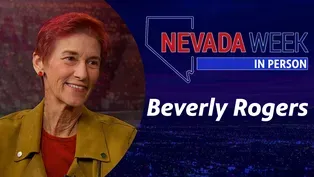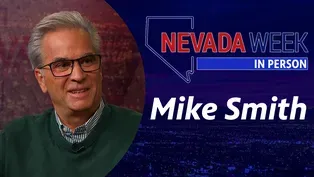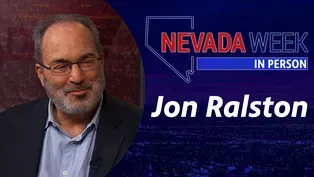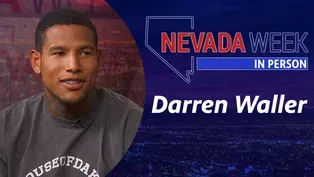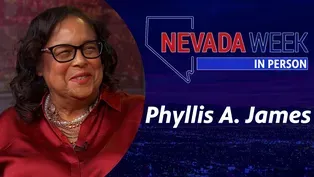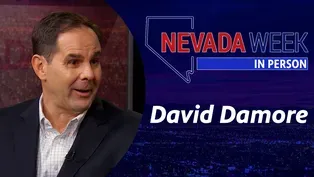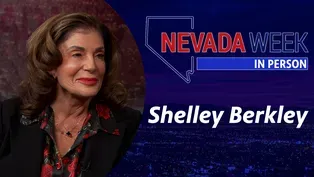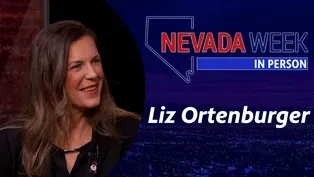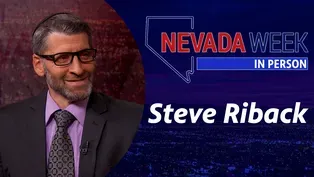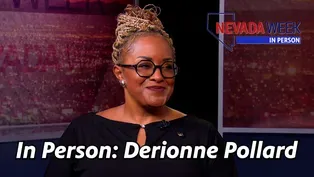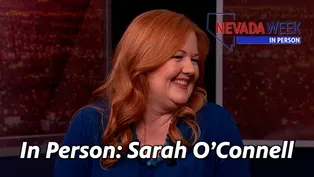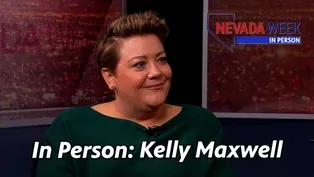
Nevada Week In Person | Wendi Schweigart
Season 1 Episode 19 | 14mVideo has Closed Captions
We talk one-on-one with founder of Project Marilyn Wendi Schweigart.
We talk one-on-one with the founder of Project Marilyn, a nonprofit that collects and distributes period kits to other nonprofits, Wendi Schweigart.
Problems with Closed Captions? Closed Captioning Feedback
Problems with Closed Captions? Closed Captioning Feedback
Nevada Week In Person is a local public television program presented by Vegas PBS

Nevada Week In Person | Wendi Schweigart
Season 1 Episode 19 | 14mVideo has Closed Captions
We talk one-on-one with the founder of Project Marilyn, a nonprofit that collects and distributes period kits to other nonprofits, Wendi Schweigart.
Problems with Closed Captions? Closed Captioning Feedback
How to Watch Nevada Week In Person
Nevada Week In Person is available to stream on pbs.org and the free PBS App, available on iPhone, Apple TV, Android TV, Android smartphones, Amazon Fire TV, Amazon Fire Tablet, Roku, Samsung Smart TV, and Vizio.
Providing Support for PBS.org
Learn Moreabout PBS online sponsorshipMore from This Collection
Nevada Week In Person | Beverly Rogers
Video has Closed Captions
One-on-one interview with Rogers Foundation chair Beverly Rogers. (14m)
Nevada Week In Person | Mike Smith
Video has Closed Captions
One-on-one interview with Las Vegas Sun political cartoonist Mike Smith. (14m)
Nevada Week In Person | Jon Ralston
Video has Closed Captions
One-on-one interview with The Nevada Independent CEO Jon Ralston. (14m)
Nevada Week In Person | Darren Waller
Video has Closed Captions
One-on-one interview with Las Vegas Raider tight end Darren Waller. (14m)
Nevada Week In Person | Phyllis A. James
Video has Closed Captions
One-on-one interview Phyllis A. James. (14m)
Nevada Week In Person | David Damore
Video has Closed Captions
One-on-one interview with Chair of the Department of Political Science at UNLV David Damor (14m)
Nevada Week In Person | Shelley Berkley
Video has Closed Captions
One-on-one interview Senior Vice President for Touro University Shelley Berkley. (14m)
Nevada Week In Person | Liz Ortenburger
Video has Closed Captions
One-on-one interview with SafeNest CEO Liz Ortenburger. (14m)
Nevada Week In Person | Steve Riback
Video has Closed Captions
One-on-one interview with Las Vegas Metro Police Lieutenant Steve Riback. (14m)
Nevada Week In Person | DeRionne Pollard
Video has Closed Captions
One-on-one interview Nevada State College President DeRionne Pollard. (14m)
Nevada Week In Person | Sarah O’Connell
Video has Closed Captions
One-on-one interview with Director of Eat More Art LLC Sarah O’Connell. (14m)
Nevada Week In Person | Kelly Maxwell
Video has Closed Captions
One-on-one interview with Baby’s Bounty Executive Director Kelly Maxwell. (14m)
Providing Support for PBS.org
Learn Moreabout PBS online sponsorshipOf the many charitable causes out there, hers may be one of the most unique you've heard of.
Wendi Schweigart, whose mission is to end period poverty in Southern Nevada, joins us this week for Nevada Week In Person.
♪♪♪ Support for Nevada Week In Person is provided by Senator William H. Hernstadt and additional supporting sponsors.
(Amber Renee Dixon) Wendi Schweigart is founder of Project Marilyn, a 501(c)3 nonprofit that assembles and distributes period kits containing enough personal hygiene products to get someone in need through a monthly menstruation cycle.
Wendi Schweigert, welcome to Nevada Week In Person.
We're so happy to have you.
What was the inspiration behind Project Marilyn?
(Wendi Schweigert) So I started Project Marilyn in April of 2019.
It will be three years old next month, which is exciting.
I started it after I read about period poverty in a magazine.
I read an article talking about the issue known as period poverty, and it just really struck me that I as a grown woman had never thought of what does someone do when they can't afford period supplies?
So it just really struck a chord with me, and I wanted to help.
-What does a woman do when she can't figure out where to get any of those supplies we're talking about?
-Right.
So the results are pretty tragic.
People use things that are not intended to be used for their period such as napkins, straws with cotton inside.
They use-- I've had stories of people rolling up pads to make them last longer, or they do have products but they use them for too long which can result in infections, everything from a mild infection to disrupting fertility.
So it's a pretty big issue.
-And notice how I'm just struggling to say "products," tampons or pads.
There's this taboo that surrounds menstruation.
Why?
-You know, I'm not really sure why or where it started, but it is true that it is extremely taboo.
I've had donors say if you stop talking, we'll make you a donation, you know, and the facts are that the more we talk about periods, and I tend to say "period supplies" not necessarily feminine hygiene, because that cues to what is that, is that deodorant, is that toothpaste?
No, we're talking about your period.
I want to get to the point.
And the more we talk about this issue I think because, you know, it's always been private and some people still feel that way and we want to be respectful always of people's comfort levels, but the more we talk about it is the only way that the issue is going to be resolved.
-And this is named after your mother.
-It is.
It's named after my mother Marilyn.
We lost her to cancer in 2011, so our logo is actually her face and that's actually her signature that I kept off her driver's license after she passed away.
She always wore false eyelashes and nude lipsticks.
So if you look at our logo, those were her trademarks.
And periods weren't her thing, menstruation was not her cause, but she definitely was an amazing woman who had a tough life and pulled herself up by her bootstraps and was a boss babe before that was really a thing.
So she taught us to give back to the community, to treat people with dignity, and that's what we do in her honor.
We give people dignity with their period.
-I wonder what she might have thought of this because she does come from a different time period and we're talking about taboo.
Would she have said Wendi, what are you doing?
-I don't think so.
I think, you know, some people in my family will say I don't know that your mother would like her face on a bag of tampons.
I always say well, her face is on a bag of dignity.
That's what we're doing.
And I think she really was ahead of her time, and yes, she was a wife of the 50s and things were different then, but she always was pretty progressive in certain ways.
So I think she might have been taken aback, same as I was, about the issue and I think she would have said get after it.
Let's work on that.
-So personal hygiene products, you want to avoid that word because that could mean a lot of different things.
-Yes.
Feminine hygiene, and what I found is certain people are-- like you said, it's taboo so they are comfortable with different terminology, but I found we have better results when we say period supplies.
That's what it is, it's for your period, so let's just get to the point.
-So you're navigating around terminology.
What does one of these period kits include?
-So when we started-- so the kit is intended to have enough supplies for an entire cycle.
Now, everyone's period is different, that's certainly a moving target, so we just based the bag's contents off the FDA's recommendation.
An average cycle is five days, and then per the package, you change your product every four to six, six to eight hours.
So our first bags have 15 tampons, five overnight pads-- because Marilyn never let us wear a tampon overnight-- five panty liners and five hygiene wipes.
And then in our travels, we discovered a lot of our clients don't use tampons, and when they don't use tampons, they emphatically do not use tampons.
So we developed another kit which has 20 pads depending-- and the size is very dependent on what we have been donated, what we have on hand.
So 20 pads, five panty liners and five hygiene wipes.
-Do you know why pads are preferred?
-I think again it's a personal choice, but what I'm learning-- and again, this is my personal knowledge.
I'm not a period expert or culture expert or religious, but it does seem certain religious groups, certain cultural groups, anyone with any kind of sexual trauma, you know, about the insertion, they just don't want to use them.
And then, you know, information has been shared with me that sometimes a panty liner or a pad is just a clean pair of underwear for a person who is home insecure, doesn't have regular laundry facilities.
So in this, I've learned so much about what people go through on a daily basis, especially now when gas is over $5 a gallon and, you know, women put ourselves last normally.
So it's not, you know, out of the realm of possibility you're going to buy your kids milk and you're going to put gas in your car, and then you're going to put toilet paper in your underwear and you're going to go on with your life.
And that's just is unacceptable.
-You brought up your mom, Marilyn, not allowing you to wear a tampon overnight.
Why is that?
-I think again her being from a different time, I think-- and again no expert, but there's toxic shock to wear the tampon too long.
I think possibly technology has come a long way since her days of tampons, and I think a lot of things are passed down generationally so it was just her belief that you didn't wear a tampon overnight.
-So much that you are learning that's connected to these products.
You also talked about women putting themselves last but as a donation item, people put this-- they don't even think about it.
-They don't.
So our main mission is to donate to other nonprofits and agencies that serve the community, because period supplies tend to be the least donated item when the community comes together to help.
People are very concerned about school supplies, clothes or they wonder does that person have enough food, are they warm, which are all super valid points, but there is this one additional piece that people with a period have that is additional and needs to be recognized and provided for.
-So what are the ways that people can donate and also sponsor a period, I understand.
-Right.
So first like I said, we'll just be three years old next month and navigating this journey has been educational and I'm learning new things every day, and it is helpful to have reoccurring monthly donations.
You can go to our website at projectmarilyn.com, and we do have a banner show up that has you can sponsor a period for $10 a month.
And I never want to take things for granted and people's finances for granted, but if you can afford $10 a month, you set it and forget it and then you are sponsoring someone with a kit every month.
That reoccurring donation allows us to have a better line of sight on our budgeting.
You know, big donations are great, big lump sums we'll obviously never turn down, but that reoccurring monthly donation allows us to see what we have coming in and what we have going out and allows us to plan a little bit better.
-Do you want people to actually donate the physical items as well?
-That's great, too.
What I have learned again, still on this journey, is people like to participate in the way that makes them feel fulfilled, a way that makes them feel comfortable.
So if that's product donation, we have a link to our Amazon wishlist on our website.
We do accept any donation of pads, tampons and hygiene wipes as long as they're individually wrapped.
That's what goes in our bags; however, we do find a home for everything.
A lot of our clients do prefer in bulk and some other options that help them serve their clients better than the kits we put together.
So we are able to serve our products up in a wide variety of ranges.
But yes, if you'd like to donate to us, it is easy to visit our website, go to our wishlist and the items ship directly to us.
-You're doing this in honor of your mother who passed away from cancer, so some would think well, why not get involved in a cancer cause, but you're also doing that as well.
-I'm doing that too.
-How?
-So she passed from cancer in 2011, and the American Cancer Society helped us out tremendously in that journey.
They provided support.
The biggest program we used is called the Road to Recovery, which has been on pause for a while with COVID but now is coming back, where volunteers drive the clients to treatment.
It was such a godsend to have that because it was just me and her at the time out here in Las Vegas, and it was hard for me to get her to treatment at the time she needed to go.
So these volunteers came, they drove her, and they became a friend and a resource for her to talk to because you don't always want to talk to the caregiver, especially when it's your child.
So we were very blessed to have them so since then, since she passed, I have been involved with the American Cancer Society.
I do sit on their leadership board here, and it's a blessing to be able to give back to them when they gave us so much.
-And how are you connected to cancer versus-- -Construction vs. Cancer.
Right.
So in our day life-- so Project Marilyn is my labor of love.
In our day life, my husband owns a general contracting company, NDL Group, and they are actually our founding sponsor.
They donate us a space within our construction company that we're able to work out of which is outstanding.
So being that we are general contractors, American Cancer Society has an annual event called Construction vs. Cancer.
It serves childhood cancer research and support.
So every year we are the sandbox sponsor, and that's how I got involved.
I was looking for a way to get involved and reached out and said, you know, this is a great event, would you like to sponsor?
So every year it's like a construction-themed fair where they bring out equipment and booths and the construction community just rallies around this event.
And it's so much fun.
-A woman in construction, what is that like?
-So I'm a woman in construction, but I don't want to take away from any of the women that are doing construction.
You know, I do the business development, which I love, our marketing.
Our community is so fabulous.
It is different when you're in the office and you're around job sites.
You know, things are rowdy and fun and, you know, it's great.
It's a great atmosphere.
I love it.
-I did want to ask you a couple rapid-fire questions.
-Oh, goodness.
-You have to know, the nicest bathrooms in Las Vegas, where are they?
-Well, I don't know what-- so I would have to say-- I would say the nicest bathrooms in Las Vegas are Station Casino bathrooms because they offer free period supplies in their bathrooms.
-You took a picture-- and that's a huge deal-- took a picture on your social media.
You were at a local casino, and they didn't have any.
-They didn't.
And you know, the thing is we're really on a mission to get public restrooms to offer free period supplies because having your period is a natural biological function.
We can't control when it comes.
No matter what you think of someone's life choices that have led them to the path where they may not be able to afford period supplies, it's still coming and we need to recognize that.
And you know, how do we want someone to go to a job interview or hold their head up high when they have napkins in their underwear?
It's just-- people are missing school, work, and it's a problem.
So we really would like to see period supplies provided for free in public restrooms, just like the toilet paper.
-Well, that would be probably your answer to the next question, what does Southern Nevada need more of?
-Free period supplies.
-Wendi Schweigart, thank you so much for your time and for coming in.
-Thank you.
-And for more information on how to help Project Marilyn, go to vegaspbs.org/nevadaweek.
That is where you can also find the latest episode of Nevada Week or watch it on air Sunday at 5:30 p.m. and Tuesday at 7:30 p.m. ♪♪♪
Support for PBS provided by:
Nevada Week In Person is a local public television program presented by Vegas PBS
